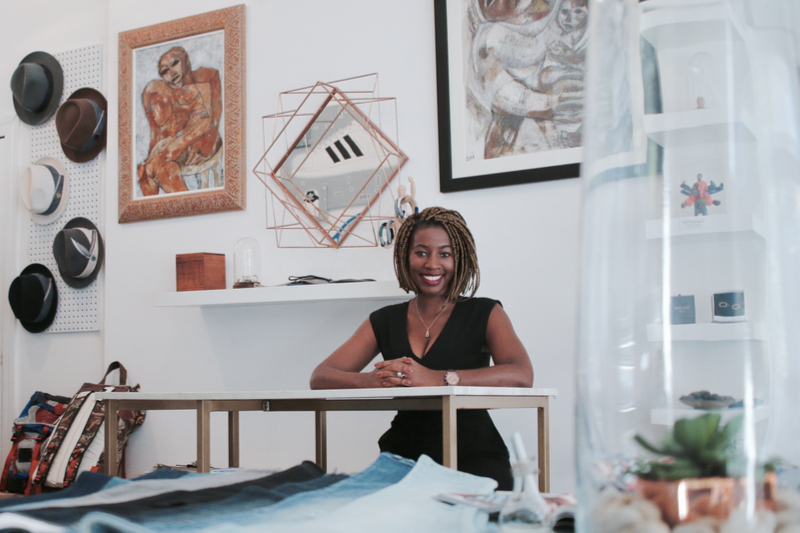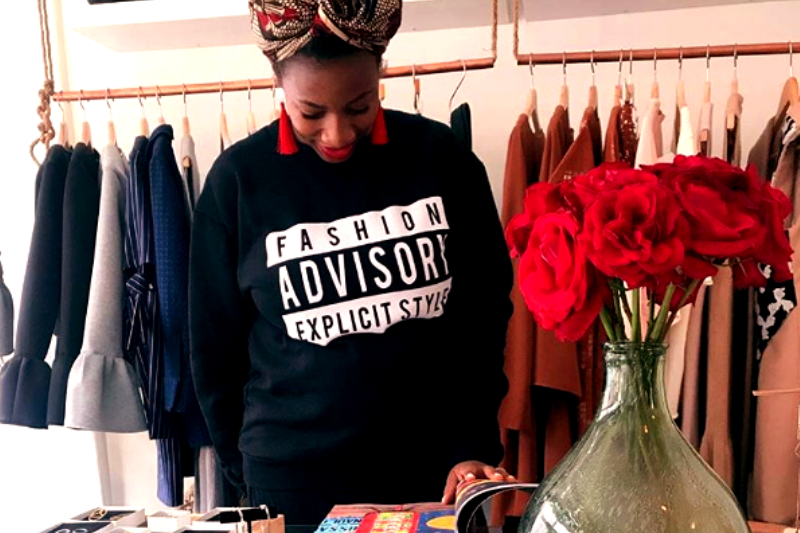From designing celebrity fashion lines for Beyoncé to building a conversational platform for creative women, Farai Simoyi’s track record is almost as impressive as the scope of her many current projects. She designs her own fashion line, curates partnerships with African artisans, and runs a trendsetting retail shop “The Narativ” in Bed-Stuy, Brooklyn. How does she do it? Simoyi says it’s all connected to her mission of giving back.
What was the spark that led you to fashion design?
I’ve always wanted to be a designer. When I first started out I thought “let me work in corporate so I can learn how I want to build my own line.” Once I started working in fashion, especially when I was at Deréon (Beyoncé’s fashion line), I realized that we were making these guys a lot of money and that if I can make money for these guys then I should start my own line and make money for myself. I wanted to learn everything I could learn before I dove in and did my own thing. That was the spark. If they can do it, I can do it.
That’s a great first experience, taking what you learn from others and using it for yourself. Now you are taking what you know and giving it to others. What goes on in your Concept Store, The Narativ?
The Narativ is a retail and design space but it’s really more like an agency. We focus on working with brands and artisans that are in Africa. I’m originally from Zimbabwe and for years we used to go home and bring stuff back, for us, for our family, for our friends, and people are like “that is so cool where did you get that?”
Then it was like ding! ding! If people want all this stuff, maybe I should figure out a way to bring it over here. There’s always a story behind every brand that I bring into this store, so once people start exploring, they’re also being educated. Basically, The Narativ stands for telling the African narrative through design.
The store is a creative hub for designers, artists, and artisans. My partner and I came together to do this store because we come from the fashion industry, and what we’ve realized is there are so many cool brands but they end up disappearing. It’s not because of lack of talent; it’s because of lack of business structure, lack of finances, and lack of support. People are more likely to go shop at H&M as opposed to buying from an independent designer. We decided to come together and do a store to give visibility to different brands. The products come in here and then we offer them brand support to help them get into other retailers. We help them with business structure in terms of promotion, advertising, marketing, whatever they need.

How do you find brands to collaborate with? And what role does content play in bringing their stories forward?
The brands in the store now are ones I’ve personally met. I met Mary Jean Treloar (of Mary Jean Jewelry) a couple years ago. I met Rus in Johannesburg on the street. He was there with his crochet needles and I approached him about buying and bringing some of his designs to the U.S. We’ve been working with him to help him copyright his work because the second I bring it into this market someone can steal this design and technique.
Now, since I can’t go back and forth, we’ve hired a brand curator, Kwena Baloyi. She’s in South Africa helping us scout new brands and new talent. Once we get the finances, she’ll be traveling all through the continent helping us bring stories.
We also created a podcast called, The Narativ, where you will hear the narratives & creative journeys of the artists and artisans we work with. The first episode aired in May 2018 and you can find us on Anchor, Google, or Apple-supported Podcasts.
View this post on Instagram
What is your mission with these projects?
The mission for me is very personal because I have been granted so many opportunities. So many people I know from back home weren’t given that. I can’t be a child of Africa and not give back. If all those people had the same experiences as me they would be way beyond me and would be doing so much more. It’s about giving back in terms of allowing creatives on the continent to find a way to promote themselves.
But there’s a much deeper entity. Where I’m from empowering one person is like empowering an entire community. So while I’m not trying to be a Mother Theresa, I understand the value of being able to give back through opportunity and not through handouts.
This mission is similar to a design you have that reads, “I am because you are.” When was that design created?
I think I did that in 2014. It was around the time Nelson Mandela died and that’s part of the inspiration. “I am because you are” is derived from the Southern African word ubuntu. Ubuntu is togetherness. It’s community. It’s it takes a village. It’s because of you, I am, I am because you are. So that was the concept behind creating the line and the shirt. And when I did it I didn’t think anything of it but it created such a movement. The road has been paved and now our job is to pave the road for other young women who are coming up behind us.
This reminds me of another project you’re working on called Bloom. Can you tell us more?
Bloom came about in 2016. While I was home in Zimbabwe I met Nandi Dlepu. She has her own creative agency in South Africa. I approached her about putting together a women’s brunch on my visit to South Africa. I was just compelled to meet some of my sisters and create a sisterhood. From us having the conversation, we decided this needs to be more than just a one-off thing.
We need to create a safe space for women to come together and speak and then the whole concept became building a conversational platform. Part of it is we’re creating this “in real life” sorority. It starts on URL but then it comes IRL. We have the chapter here in NYC and a chapter in Johannesburg, South Africa. This year we are going to start opening chapters up to different places.
What products, brands, or trends are you most excited about in 2019?
People are not nearly as interested in purchasing clothing and apparel as they used to be. That’s been a big shift! They’re a lot more interested in home goods and creating a home space for themselves that feels comforting and inviting, especially with everything going on in the outside world today.
We work with a lot of African creatives and we’re seeing a big demand for African art, home decor, hand-woven baskets/catchalls, and other handmade items to support that. We also just announced an exclusive ceramics collaboration project just for our store with a very well-known artist from Cape Town, South Africa: Alfa X Ash Ceramics.
View this post on Instagram
Their hand-drawn ceramic cups are incredibly versatile — people use them to hold tea, jewelry, office supplies, smudging collections, etc.
Just for fun, complete this sentence: “Other than my phone, I never leave home without…”
Hand cream. I started making my own when I realized the store-bought stuff is filled with so many harmful chemicals. I bought all these natural ingredients on Amazon: the shea butter, the cocoa butter, the oils, and essential oils. I think again it’s my love of being hands-on with everything I do plus it’s really easy to make.




